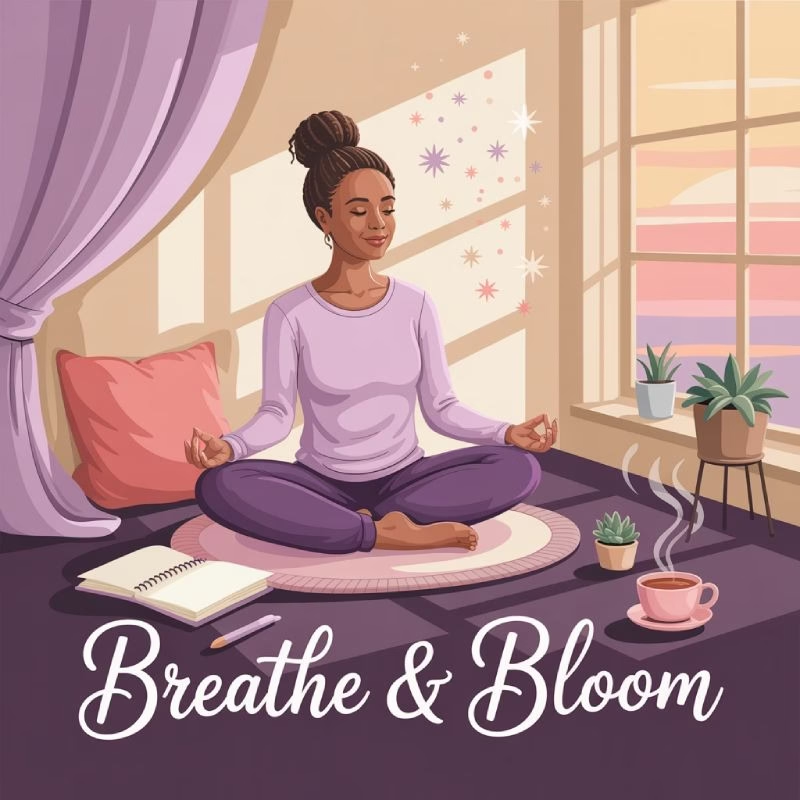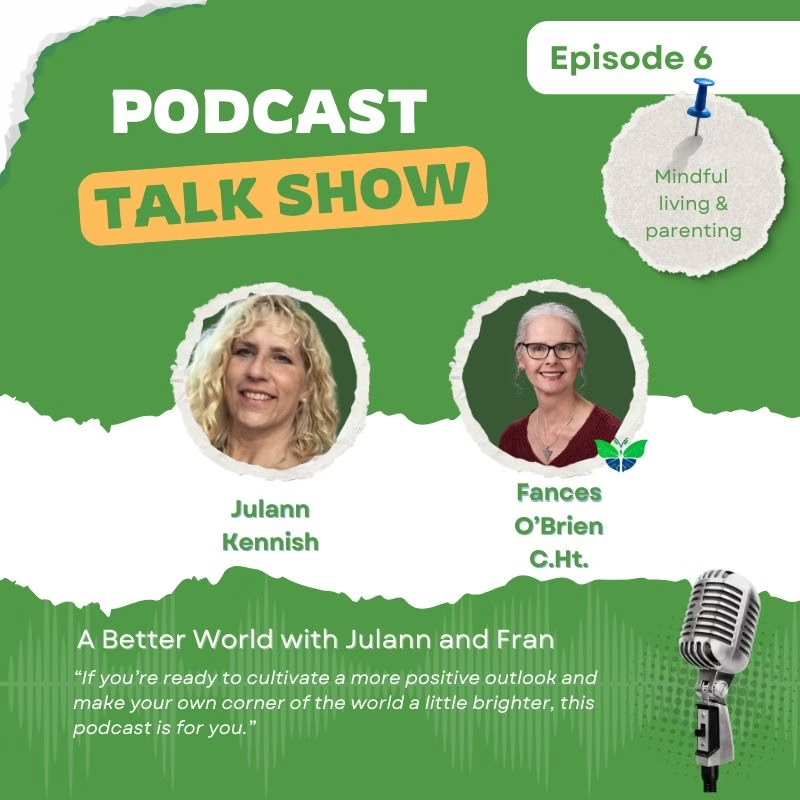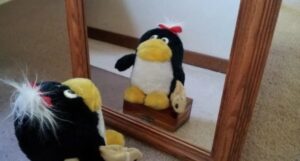
When you use EFT on yourself, you raise your energy, and that can only have a positive effect on anyone...
Table of Contents
ToggleWhat if the secret to a more fulfilling life isn’t about achieving more, but about being more present in each moment? In a recent episode of “A Better World with Julann and Fran,” hosts Julann and Fran explored the profound practice of mindful living through intimate conversations about self-compassion, presence, and the art of making each day count.
The episode opened with a powerful reading of “The Dash” by Linda Ellis – a poem that reminds us that what matters most isn’t the dates on our tombstone, but how we spend the dash between them. This simple yet profound message became the foundation for a deeper exploration of mindful living practices that can transform our daily experience.
One of the most striking insights from the conversation was Julann’s observation about our tendency to be “mean to ourselves.” As she shared during her recent medical appointment, “We’re often in our heads, worrying about what we should have done, what we didn’t do… we’re just mean to ourselves.”
This internal criticism isn’t just emotionally draining – it actively prevents us from living mindfully. When we’re caught in cycles of self-judgment, we miss the present moment entirely.
The Oxygen Mask Principle: Fran introduced a powerful analogy that every mindful living practitioner should remember: “When you’re on a flight and the oxygen mask drops, you have to put yours on first before you can help anybody else.” This isn’t selfishness – it’s practical wisdom for sustainable compassion.
The Grace Practice: When life gets hectic (a dishwasher leak, running late for appointments), Fran suggests taking a moment to offer yourself grace. Instead of spiraling into stress, pause and acknowledge: “Something unforeseen happened, and that’s okay.”
Mindful Awareness of Stress Patterns: Both hosts emphasized how stress literally changes our body chemistry, making us more susceptible to illness and less capable of handling life’s challenges. Recognizing this connection is the first step toward more mindful responses.
During their conversation, Julann made a keen observation about modern life: “At church today, everybody is rushing to the next line… nobody is taking a breath to try to be present.” This rushing mentality has become so normalized that we often don’t realize how much we’re missing.
Mindful Living Practice: Instead of constantly preparing for the next moment, try this approach:
Julann shared a beautiful insight about mindful awareness: “If you’re present and you pay attention, there are little things that happen that you may miss if you’re so in your own head… like finding your keys, or a bag falling that reminds you to do something important.”
These aren’t coincidences – they’re the natural result of mindful attention. When we’re present, we notice opportunities, solutions, and guidance that our distracted minds miss entirely.
Julann introduced a powerful mindful living practice called “scripting” – writing about desired outcomes as if they’ve already happened, with gratitude:
This practice combines several mindful living principles:

Some people resist mindful living techniques, thinking “that won’t make any difference.” Julann’s response is perfect: “What do you have to lose to try it?”
The key is approaching new practices with beginner’s mind – staying open and curious rather than skeptical and closed.
Fran shared wisdom from Mel Robbins’ book “Let Them,” explaining how mindful living applies to relationships: “You try to fix things, make everything better, help them along the way, but you have to remember they have their own path.”
Julann’s approach with her grandchildren demonstrates mindful parenting in action:
The conversation revealed a profound truth: mindful living isn’t just personal development – it’s world-changing. When we practice self-compassion, presence, and kindness with ourselves, we naturally extend these qualities to others.
The Science of Mindful Living: As Julann noted, “The more stressed you are, the more you focus on negative things, your body actually changes and becomes less healthy.” Conversely, mindful living practices create positive physiological changes that enhance our ability to connect, empathize, and contribute positively to our communities.
Fran’s nephew, a police officer recently promoted to community liaison, exemplifies how mindful living creates professional success: “People are noticing that your kindness and your hard work are important.” In a world that sometimes mistakes kindness for weakness, mindful living practitioners prove that compassion is actually a superpower.
Week 1: Foundation Building
Week 2: Expanding Awareness
Week 3: Relational Mindfulness
Both Fran and Julann emphasized that mindful living isn’t about perfection. Fran shared: “Sometimes we lose our tempers, sometimes nothing goes right… but I still enjoyed it.” This is the essence of mindful living – finding presence and gratitude even in imperfect moments.
Key Mindful Living Principles:
The conversation highlighted that mindful living requires consistent practice but doesn’t need to be complicated. Start with Fran’s simple commitment: “Be kind to yourself this week.” From this foundation of self-compassion, all other mindful living practices naturally flow.
Remember: Every moment offers a fresh opportunity to choose mindful presence over mindless reactivity. As “The Dash” poem reminds us, it’s not about the years in your life, but the mindful life in your years.
Julann and Fran’s conversation offers a beautiful invitation: What if this week, you committed to just one mindful living practice? Whether it’s offering yourself more grace, practicing presence, or trying the scripting technique, small steps toward mindful living create ripple effects that extend far beyond your own experience.
As they reminded us, creating a better world starts with being kinder to ourselves. Mindful living isn’t just a personal practice – it’s a gift we give to everyone whose lives we touch.
Join hosts Julann and Fran for heartfelt conversations about creating positive change through mindful living, self-compassion, and practical wisdom. Each episode explores how small shifts in awareness can create profound transformations in our lives and communities.
Listen to the complete conversation to discover more mindful living insights and practical techniques for living with greater presence, purpose, and compassion.

Mindful living is the practice of bringing conscious awareness and presence to all aspects of daily life, not just during formal meditation sessions. While meditation is a specific practice done at set times, mindful living means integrating awareness, self-compassion, and intentional presence into everyday activities like eating, parenting, working, and relating to others. As discussed in the podcast, it’s about being fully present in each moment rather than constantly rushing to the next thing.
Start small with what Fran calls “taking a breath.” You don’t need hours of free time to practice mindful living. Begin with:
The key is consistency with small practices rather than trying to overhaul your entire routine at once.
Scripting is a mindful living practice where you write about desired outcomes as if they’ve already happened, expressing gratitude for them. For example:
This technique combines intentional focus, gratitude cultivation, and belief alignment with your desired reality. Write 3-5 statements daily, focusing on how grateful you feel for these outcomes.
Self-compassion is the foundation of mindful living because, as Julann explained using the “oxygen mask” analogy, you must take care of yourself first to effectively help others. When we’re constantly criticizing ourselves or caught in worry cycles, we can’t be truly present. Self-compassion allows us to:
Mindful living transforms relationships through several key practices:
As Julann noted, “People notice when your kindness and hard work are important” – mindful living creates deeper, more authentic connections.
Absolutely! Mindful living is especially beneficial for anxious or negative thought patterns. The practice helps by:
Remember Fran’s advice: “What do you have to lose to try it?” Start with small practices and be patient with yourself as new habits develop.
Mindful parenting and family life involves:
You’ll notice mindful living is taking effect when you:
Yes! As discussed in the podcast, there’s a direct connection between our mental state and physical health. Chronic stress and negative thinking patterns literally change your body chemistry, making you more susceptible to illness. Mindful living practices help by:
Many people notice immediate benefits like feeling calmer or more centered after just one mindful breathing session. However, lasting transformation typically occurs within:
Remember, mindful living is about progress, not perfection. Even small, consistent practices create meaningful change over time.
Mindful living isn’t about forcing positivity or denying difficult emotions. Instead, it’s about:
As Julann shared, “Sometimes we lose our tempers, sometimes nothing goes right… but I still enjoyed it.” Mindful living means finding presence and meaning even in imperfect moments.
The Relieve Your Mind’s Team
Do you like this post? Share the
Recent Posts

When you use EFT on yourself, you raise your energy, and that can only have a positive effect on anyone...

On September 18, 2024, l'll be speaking at an online conference addressing the Emotional and Psychological Impact of Cancer Treatment.

Have you ever noticed that when you’re feeling the most stressed, often you want to eat more? Worse, you crave...

If you use this technique daily, you may just find you feel better in general.
If you have issues that you want to release, Emotional Freedom Technique (EFT) can help you do away with them.

How you talk to yourself makes a difference. If you tell yourself you’re doing something in an attempt to avoid...

According to Judith Acosta and Judith Simon Prager, co-authors of the book The Worst is Over, immediately following a serious...

The Shui Gou Point is an acupuncture point in the meridian named Governing Vessel. Applying pressure on this point for...

When you're experiencing stress, it's quite likely that your shoulder and neck area will become stiffer and more rigid. The...
For More Information about using Emotional Freedom Technique Read
Explore More Podcast Episodes
“At the end of your life, you’re the only one who really knew yourself. You better live for you.”
– Andi Hess
Both Fran and Julann emphasized that mindful living isn’t about perfection. Fran shared: “Sometimes we lose our tempers, sometimes nothing goes right… but I still enjoyed it.” This is the essence of mindful living – finding presence and gratitude even in imperfect moments.
Key Mindful Living Principles:
Special Offer
Get Your Consultation For Free Today
Your consultation is free of charge. Let's improve your life together.
Services
Group Sessions
Handwriting Analysis
Office
Currently only seeing clients online via Zoom or via phone
Mon - Thurs: 9 a.m. - 5 p.m.
Fri: 9 a.m. - 4 p.m.
Sat - Sun: hours arrangeable
24-hour notice required to schedule, cancel or change an appointment (Sunday not included)
Contact
© 2025 Relieve Your Mind | All Rights Reserved | Powered by X Times More